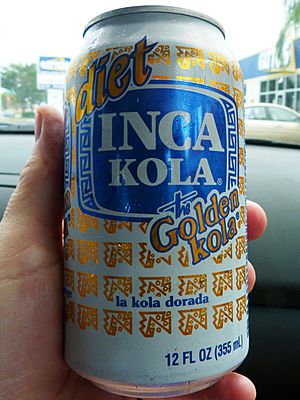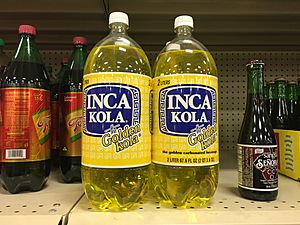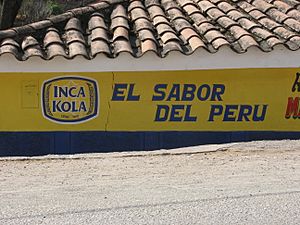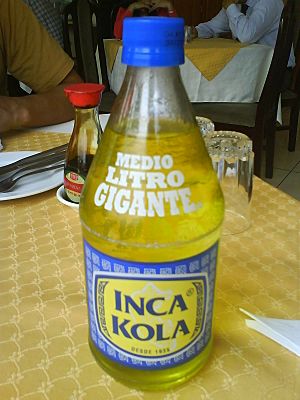Inca Kola facts for kids
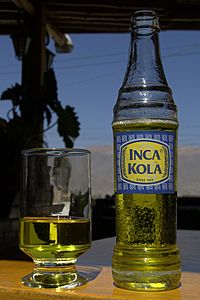 |
|
| Type | Soft drink |
|---|---|
| Manufacturer | Corporación José R. Lindley S.A. |
| Country of origin | Peru |
| Introduced | 1935 |
| Related products | Coca-Cola, Kola Real |
Inca Kola is a popular soft drink that was first made in Peru in 1935. It was created by a British immigrant named Joseph Robinson Lindley. This soda has a sweet, fruity taste. Many people say it tastes a bit like lemon verbena, which is a plant. Some people in America think it tastes like bubblegum or cream soda. It is sometimes called a "champagne cola."
The Coca-Cola Company owns the Inca Kola brand almost everywhere in the world, except for Peru. In Peru, the brand is owned by a company called Corporación Inca Kola Perú S.A.. Since 1999, this company has been a partnership between The Coca-Cola Company and the Lindley family. The Lindley family used to own the company completely.
You can find Inca Kola in some parts of South America, North America, and Europe. While it's not as famous outside Peru, you can often find it in stores that sell Latin American foods. Inca Kola comes in bottles and cans. Its design often features symbols from the ancient Inca civilization.
Contents
The Story of Inca Kola
How it Started
The story of Inca Kola began in 1910 in Rímac. This is one of the oldest neighborhoods in Lima, Peru. An English family, the Lindleys, started a small company there that bottled drinks. In 1928, their company officially became Corporación José R. Lindley S.A.. Joseph R. Lindley was the first person to manage the company.
By the early 1930s, the company made ten different kinds of soda. These included Orange Squash, Lemon Squash, and Champagne Kola. In 1935, Lima was celebrating its 400th birthday. To mark this special event, Lindley introduced Inca Kola. The flavor was inspired by Lemon Verbena, a plant known as Hierbaluisa in Spanish. Joseph Lindley tried many different mixes and ingredients. He finally found a special blend of thirteen plant-based flavors. The company launched Inca Kola with a slogan that meant, "There is only one Inca Kola and it's like no other."
Becoming Peru's Drink
By the mid-1940s, Inca Kola was very popular in Lima. The company used strong advertising campaigns. They connected Inca Kola to Peruvian pride and history. They used images and symbols from Peru's national and native cultures. This advertising worked very well, and the company made many more bottles of the soda.
By 1970, Inca Kola was bought by 38% of people in Peru. It became more popular than all other fizzy drinks in the country. It was known as "Peru's Drink" (La Bebida del Perú). In the late 1970s and early 1980s, a common slogan was "Made of National Flavor!" (¡De Sabor Nacional!). Later, this changed to "The taste of Peru" (El Sabor del Perú).
On January 22, 2009, Inca Kola teamed up with D'Onofrio. D'Onofrio is a famous Peruvian ice cream brand owned by Nestlé. Together, they launched an ice pop that tasted like Inca Kola.
In the United States, Inca Kola is made by the Coca-Cola company. You can find it in supermarkets in 2-liter (68 U.S. fl oz) bottles, cans, and smaller bottles. There is also a diet version of Inca Kola available.
Competition and Changes
In 1995, Coca-Cola had 32% of the soda sales in Peru. Inca Kola had slightly more, with 32.9%. Since then, Inca Kola's share has grown. This is partly because some fast-food restaurants started selling it. For example, Bembos, a Peruvian fast-food chain, switched from Coca-Cola to Inca Kola in 1995. Also in 1995, McDonald's in Peru started selling Inca Kola because customers wanted it. This was before Coca-Cola owned the Inca Kola brand. At that time, it was the only place in the world where McDonald's agreed to sell Inca Kola.
Partnership with Coca-Cola
In 1997, the Lindley company made some big changes to its business. This led to a lot of debt, and the company lost almost $5 million in 1999. Looking for help, the Lindley company turned to The Coca-Cola Company. Coca-Cola bought half of Inca Kola Perú and one-fifth of Corporación José R. Lindley S.A. The exact amount was not shared, but it was thought to be around $200 million. Johnny Lindley Taboada, a grandson of the founder, became the chairman of the new partnership. Coca-Cola became the only owner of the Inca Kola brand outside of Peru. Inside Peru, they formed a joint company. Today, Inca Kola is bottled by The Coca-Cola Company in places like Ecuador and parts of the United States.
New Competitors
While the two big companies were making their deal, many smaller companies started in Peru. They began selling drinks that competed with both Coca-Cola and Inca Kola. Some of these new drinks included Peru Cola, Cola Nacional, and Kola Real. For Inca Kola, competitors included Isaac Kola, Triple Kola, and Oro. These new companies often said that Inca Kola was no longer a Peruvian company because it had partnered with a foreign company.
In 2004, Corporación José R. Lindley S.A. began talks to buy another bottling company. This company, Embotelladora Latinoamericana S.A., had been bottling Inca Kola since 1973. They had complained that the price of Inca Kola concentrate had gone up a lot after the deal with Coca-Cola. So, they stopped bottling Inca Kola in 2000. In early 2005, Corporación José R. Lindley S.A. bought two-thirds of Embotelladora Latinoamericana for $215 million. Now, Corporación José R. Lindley S.A. bottles Inca Kola and all Coca-Cola products using these facilities. Together, they have about 60% of the market share.
Other Drinks Like It
- List of soft drinks by country
- Irn-Bru – a Scottish soft drink with a similar flavor
- Isaac Kola – a direct competitor
- Oro – another direct competitor
- Triple Kola – a direct competitor
- Viva – a direct competitor
See also
 In Spanish: Inca Kola para niños
In Spanish: Inca Kola para niños
 | Audre Lorde |
 | John Berry Meachum |
 | Ferdinand Lee Barnett |


